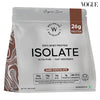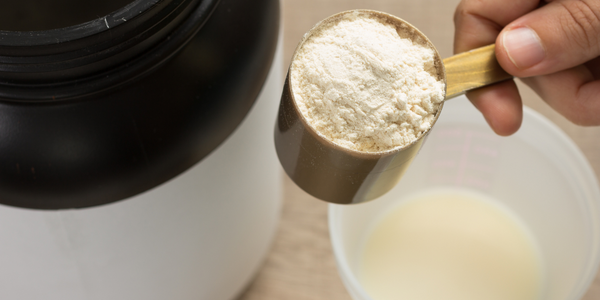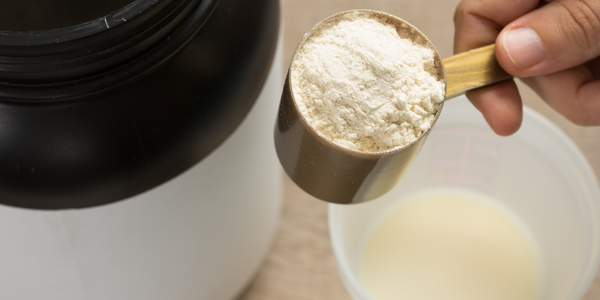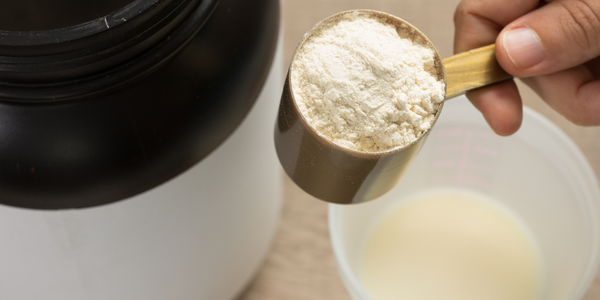If you’ve ever wondered whether drinking whey protein on an empty stomach is beneficial, you’re not alone. Many people debate whether having a protein shake first thing in the morning or between meals improves muscle recovery, boosts metabolism, and enhances overall health—or if it leads to digestive discomfort.
So, should you take whey protein on an empty stomach? Let’s break it down!
1. Faster Absorption & Quick Muscle Recovery
Whey protein is one of the fastest-digesting protein sources available, making it ideal for quick muscle recovery and protein synthesis. When consumed on an empty stomach, the body processes it more efficiently, ensuring that essential amino acids reach the muscles rapidly. This fast absorption helps reduce muscle fatigue and supports tissue repair, making it an excellent choice for post-workout recovery.
Explore: Whey Protein and Digestive Health: What You Need to Know
2. Supports Muscle Growth & Prevents Muscle Breakdown
After a long overnight fast, the body may start breaking down muscle protein for energy. Taking whey protein in the morning prevents this breakdown and promotes muscle protein synthesis, helping maintain and build lean muscle mass. Consuming protein early in the day also provides a steady supply of amino acids, ensuring optimal muscle growth over time.
3. Increases Fullness & Reduces Cravings
Whey protein helps control hunger by increasing feelings of fullness, which can prevent unhealthy snacking and overeating throughout the day. High-protein meals regulate appetite-related hormones, keeping cravings in check and supporting weight management. Having a whey protein shake in the morning can help reduce mid-morning hunger pangs and promote better dietary choices.
4. Boosts Metabolism & Enhances Fat Burning
Protein has a higher thermic effect than carbohydrates or fats, meaning the body burns more calories digesting and metabolizing protein. Whey protein also helps preserve muscle mass, which plays a crucial role in maintaining an active metabolism. A high-protein diet can improve fat loss results by ensuring that the body burns fat while preserving lean muscle.
5. Provides Sustained Energy & Improves Focus
Unlike carb-heavy breakfasts that can cause blood sugar fluctuations, whey protein provides a steady source of energy without leading to an insulin spike. It supports mental alertness, focus, and productivity by supplying essential amino acids that aid brain function. Having whey protein in the morning can help prevent energy crashes later in the day, keeping you focused and energized.
Are There Any Downsides?
While whey protein is generally well-tolerated, some individuals may experience mild digestive discomfort, especially if they are lactose intolerant. In rare cases, taking whey protein alone without carbs or fats may cause a temporary insulin spike.
Best Ways to Take Whey Protein on an Empty Stomach
-
Morning Shake: Mix one scoop of whey protein with water or milk after waking up for a quick and nutritious start.
-
Post-Workout Recovery: Consume within 30 minutes of training to replenish muscles and accelerate recovery.
-
Balanced Meal Replacement: Blend whey protein with fruits, nuts, or oats for a complete and satisfying meal.
Final Thoughts: Should You Take Whey Protein on an Empty Stomach?
Yes! Taking whey protein in the morning on an empty stomach or between meals offers faster absorption, enhanced muscle growth, fat loss, and sustained energy levels. Whether your goal is to build muscle, lose fat, or improve performance, whey protein on an empty stomach is a simple yet effective strategy.
FAQs
1. Can whey protein cause digestive issues if taken without food?
While whey protein is generally well-tolerated, some people may experience mild digestive discomfort, especially if they are lactose intolerant. In rare cases, consuming whey protein alone without carbs or fats may cause a temporary insulin spike. If you have a sensitive stomach, consider mixing it with milk or a plant-based alternative.
2. Can whey protein be used as a meal replacement in the morning?
Yes, whey protein can be a great option for a morning meal replacement when combined with other nutritious ingredients like fruits, nuts, or oats. This helps provide a balanced intake of protein, healthy fats, and fiber, keeping you full and energized throughout the morning.
3. Can whey protein help with weight loss?
Absolutely! Whey protein promotes satiety, helping to reduce cravings and prevent overeating. It also has a high thermic effect, meaning your body burns more calories digesting it compared to fats or carbs. Additionally, whey protein helps preserve muscle mass, which supports a healthy metabolism and enhances fat burning.
4. What happens if I drink whey protein without exercising?
Even if you’re not working out, whey protein can still provide essential amino acids to support muscle maintenance, metabolism, and overall health. It can help prevent muscle breakdown, keep you full, and support energy levels throughout the day. However, combining protein intake with regular exercise will maximize its benefits for muscle growth and recovery.






























 DOWNLOAD NOW
DOWNLOAD NOW
